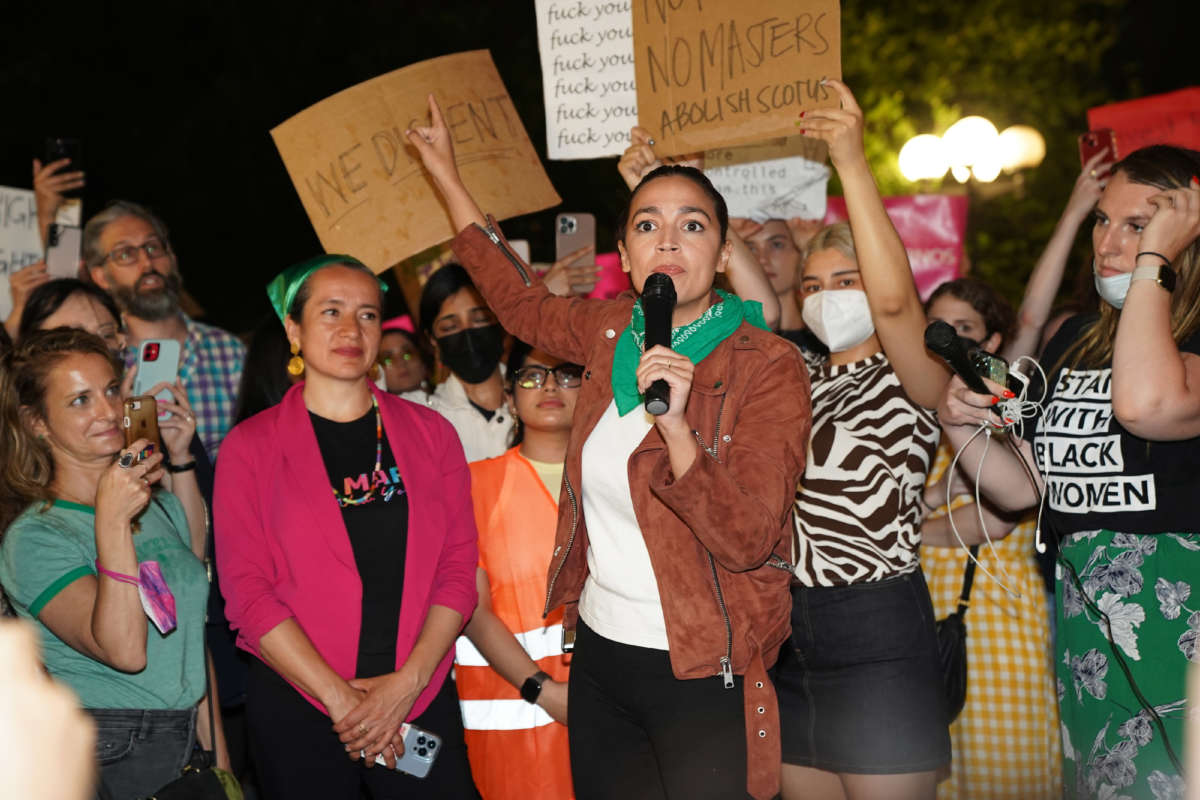Did you know that Truthout is a nonprofit and independently funded by readers like you? If you value what we do, please support our work with a donation.
In a candid interview published on Wednesday, Rep. Alexandria Ocasio-Cortez (D-New York) opened up about her experience being sexually assaulted and discussed what must be done in order for the fight for abortion rights to succeed.
Ocasio-Cortez spoke to GQ about the days following the Supreme Court’s overturn of Roe v. Wade, including her decision when the ruling was handed down to join protesters in D.C. and speak to the crowds about her personal experience being raped.
As Democrats bizarrely sang “God Bless America” on the Capitol steps at a press conference for a gun reform bill shortly after Dobbs v. Jackson was decided, Ocasio-Cortez joined the growing crowd outside. She told the publication that her decision to join protesters was “about a human need” — a need to tell the public that “their elected officials give a shit about them.”
Deciding to open up about being sexually assaulted was a personal decision, but one that she felt she had to make, she said. She first revealed that she had been raped when she was discussing the January 6 attack on the Capitol last year, and has continued speaking up about the assault in recent months as the far right has rescinded the right of millions of people to terminate pregnancies that resulted from rape.
“When I was about 22 or 23 years old I was raped,” she told a crowd in New York after the Dobbs decision came down. “I was completely alone. I felt completely alone. In fact, I felt so alone that I had to take a pregnancy test in a public bathroom in midtown Manhattan. And when I sat there waiting for what the result would be, all I could think of was, thank God I have at least a choice.”
Her vulnerability — and the vulnerability of the many people who have shared their abortion stories in support of the procedure — must not stand alone, she said. Though some reports say that women are fired up politically after the decision, Ocasio-Cortez said it will also take the support of men to win the fight on abortion. (Though trans men and nonbinary people can also get pregnant, cis women represent the largest group directly affected by the overturn of Roe.)
The progressive told GQ that men need to break free from patriarchal standards and participate in serious and often vulnerable discussions needed to combat oppressive abortion bans.
“For almost every woman that has gotten an abortion, there’s a man who has either been affected or liberated by that abortion too,” she said. “In this moment it’s really only going to be the vulnerability of men, and men talking to other men, that gives us the greatest hope of shifting things the fastest, soonest.”
She noted that men face “stigma” for being vulnerable, something they must break free from. “I think something that’s really powerful for men is to share their stories of growth,” she said. Later, she noted, “There are amazing men in this world, and not men as a final product. There are men on incredible journeys, internal journeys, journeys of transcending beyond just anger as the acceptable masculine emotion.”
Over the course of her interviews with GQ, Ocasio-Cortez also spoke about her experiences being subjugated by the Democratic Party establishment and her political future. Since day one in Congress, Ocasio-Cortez said, she has faced “open hostility” from mainstream Democrats for her presence in office, despite her huge popularity among the public.
“Others may see a person who is admired, but my everyday lived experience here is as a person who is despised,” she said. “Imagine working a job and your bosses don’t like you and folks on your team are suspicious of you. And then the competing company is trying to kill you.”
In terms of her potential to run for president, which many commentators have opined about and some progressives have called for, Ocasio-Cortez tearfully said that she thinks it would be a long shot for her to ever be elected.
While she doesn’t want to dash young people’s hopes about the future, she noted that deep-seated misogyny and racism that transcend ideology would be a powerful force against her if she were to run. “I admit to sometimes believing that I live in a country that would never let that happen,” she said.
Press freedom is under attack
As Trump cracks down on political speech, independent media is increasingly necessary.
Truthout produces reporting you won’t see in the mainstream: journalism from the frontlines of global conflict, interviews with grassroots movement leaders, high-quality legal analysis and more.
Our work is possible thanks to reader support. Help Truthout catalyze change and social justice — make a tax-deductible monthly or one-time donation today.
